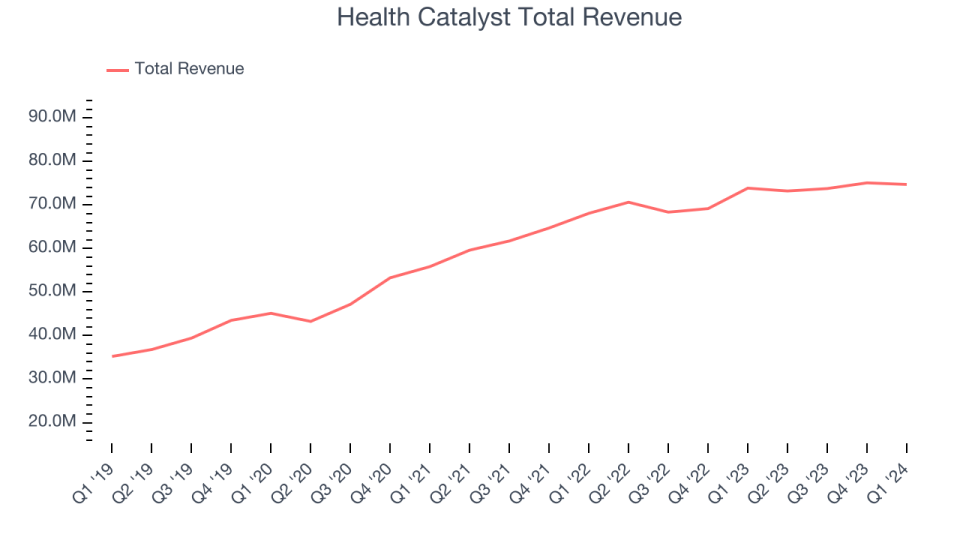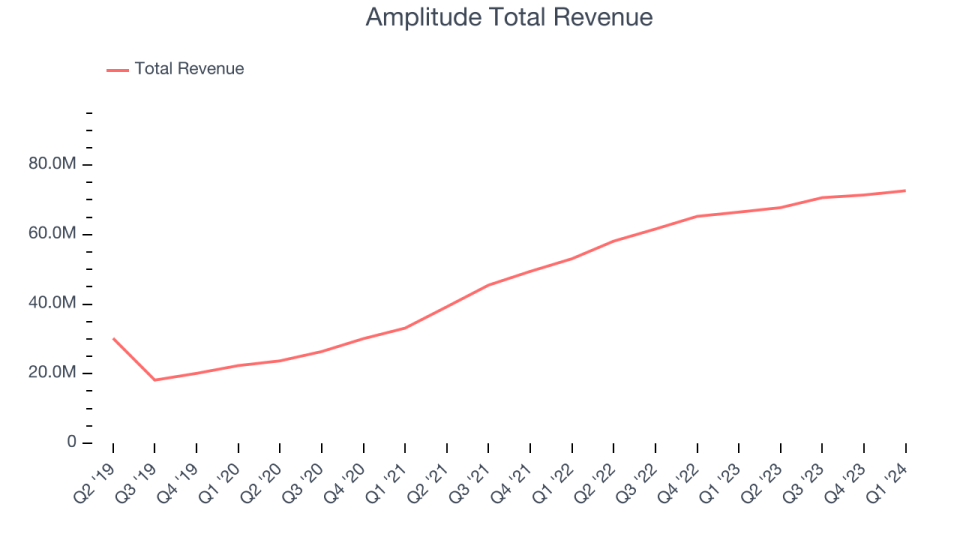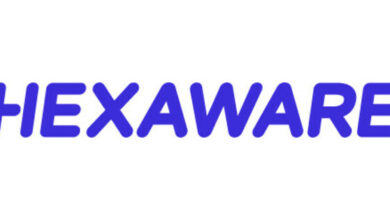HCAT) Vs The Rest Of The Pack

Let’s dig into the relative performance of Health Catalyst (NASDAQ:HCAT) and its peers as we unravel the now-completed Q1 data analytics earnings season.
Organizations generate a lot of data that is stored in silos, often in incompatible formats, making it slow and costly to extract actionable insights, which in turn drives demand for modern cloud-based data analysis platforms that can efficiently analyze the siloed data.
The 4 data analytics stocks we track reported a weaker Q1; on average, revenues beat analyst consensus estimates by 1%. while next quarter’s revenue guidance was 0.7% below consensus. Inflation progressed towards the Fed’s 2% goal at the end of 2023, leading to strong stock market performance. The start of 2024 has been a bumpier ride, as the market switches between optimism and pessimism around rate cuts due to mixed inflation data, and data analytics stocks have had a rough stretch, with share prices down 8.2% on average since the previous earnings results.
Weakest Q1: Health Catalyst (NASDAQ:HCAT)
Founded by healthcare professionals Tom Burton and Steve Barlow in 2008, Health Catalyst (NASDAQ:HCAT) provides data and analytics technology to healthcare organizations, enabling them to improve care and lower costs.
Health Catalyst reported revenues of $74.72 million, up 1.2% year on year, falling short of analysts’ expectations by 0.1%. It was a weaker quarter for the company, with underwhelming revenue guidance for the next quarter and full-year revenue guidance missing analysts’ expectations.
“For the first quarter of 2024, I am pleased by our strong financial results, including total revenue of $74.7 million and Adjusted EBITDA of $3.4 million, with these results beating the mid-point of our quarterly guidance on each metric. This financial performance demonstrates our ability to continue to scale our business as we drive toward our long-term profitability goals. We are reiterating our full year 2024 total revenue and Adjusted EBITDA guidance ranges and also reiterating both of our bookings metrics, inclusive of dollar-based retention rate and net new DOS Subscription client additions,” said Dan Burton, CEO of Health Catalyst.


Health Catalyst delivered the weakest performance against analyst estimates and weakest full-year guidance update of the whole group. The stock is down 0.4% since the results and currently trades at $6.64.
Read our full report on Health Catalyst here, it’s free.
Best Q1: Amplitude (NASDAQ:AMPL)
Born out of a failed voice recognition startup by founder Spenser Skates, Amplitude (NASDAQ:AMPL) is data analytics software helping companies improve and optimize their digital products.
Amplitude reported revenues of $72.62 million, up 9.2% year on year, in line with analysts’ expectations. It was a mixed quarter for the company, with a decent beat of analysts’ billings estimates but its net revenue retention rate in jeopardy.


Amplitude pulled off the highest full-year guidance raise among its peers. The company added 247 customers to reach a total of 2,970. The stock is up 0.1% since the results and currently trades at $9.29.
Is now the time to buy Amplitude? Access our full analysis of the earnings results here, it’s free.
Palantir (NYSE:PLTR)
Started by Peter Thiel after seeing US defence agencies struggle in the aftermath of the 2001 terrorist attacks, Palantir (NYSE:PLTR) offers software as a service platform that helps government agencies and large enterprises use data to make better decisions.
Palantir reported revenues of $634.3 million, up 20.8% year on year, exceeding analysts’ expectations by 2.7%. It was a slower quarter for the company, with a miss of analysts’ billings estimates.
Palantir pulled off the biggest analyst estimates beat and fastest revenue growth in the group. The stock is down 17.4% since the results and currently trades at $20.83.
Read our full analysis of Palantir’s results here.
Domo (NASDAQ:DOMO)
Founded by Josh James after selling his former business Omniture to Adobe, Domo (NASDAQ:DOMO) provides business intelligence software that allows managers to access and visualize critical business metrics in real-time, using their smartphones.
Domo reported revenues of $80.1 million, flat year on year, in line with analysts’ expectations. It was a weak quarter for the company, with underwhelming revenue guidance for the next quarter and a miss of analysts’ billings estimates.
Domo had the slowest revenue growth among its peers. The stock is down 9.7% since the results and currently trades at $6.45.
Read our full, actionable report on Domo here, it’s free.
Join Paid Stock Investor Research
Help us make StockStory more helpful to investors like yourself. Join our paid user research session and receive a $50 Amazon gift card for your opinions. Sign up here.



